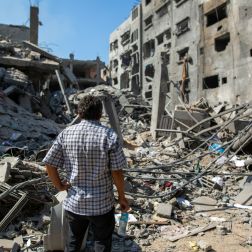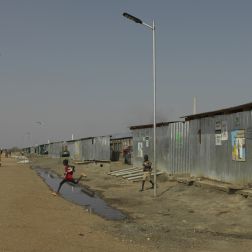- 4 mins read time
- Published: 11th October 2016
Hurricane Matthew hits hard in Haiti, Oxfam responds
Food, shelter and clean water are urgently needed in Haiti in the aftermath of Hurricane Matthew, which swept through the country on 4th October, destroying homes and infrastructure and killing hundreds of people. The United Nations has estimated more than 2.1 million people are affected, with 750,000 in urgent need of assistance. Vast areas have been flooded and thousands of families have been left homeless – many were still trying to recover from the destruction of the earthquake which hit in 2010.
At least 800 people were killed in the worst hit areas of Haiti and the greatest fear is that the possible spread of cholera and other diseases, along with food shortages due to the loss of crops, will cause more deaths than the actual hurricane over the next days and weeks.

It is feared that cholera, diarrhea and other diseases will increase after Hurricane Matthew, especially among children. Photo: Fran Afonso/Oxfam
HOW OXFAM IS RESPONDING ON THE GROUND
Oxfam teams are responding to local people most in need in Haiti. Our teams have started to assess urgent needs and distribute aid, including clean water, hygiene kits, water purification tablets and construction material such as temporary roofing materials to help people repair their homes in some of the worst-affected towns.
We are sending three tonnes of water-purifying equipment and moving rapidly to ensure hygiene and sanitation are restored to prevent outbreaks of diarrhoea, cholera and other water-borne diseases in Saint Louis du Sud, Miche, Les Cayes and Cavaillon. We are also repairing or installing clean water supplies.
We are also calling on the international community to help people cope with the widespread loss of harvests. While there is an immediate need for safe water and shelter, the main issue after this type of shock is the impact on the livelihoods of vulnerable people.
Jean Claude Fignole, Oxfam’s programme director in Haiti, said: “What is most urgent now is to provide safe water to prevent disease, as well as food and essential supplies. In the longer term we fear a jump in cholera, and malnutrition due to crop loss.”

In coordination with local authorities, Oxfam has begun distributing hygiene kits to people affected by Hurricane Matthew in order to prevent cholera and other diseases. Oxfam is also installing water tanks and distributing tarpaulins to temporarily cover the damaged roofs of houses. Photo: Fran Afonso/Oxfam
“EVERYTHING IS LOST”
Some 60,000 Haitians live in camps in the capital following the 2010 earthquake which killed at least 230,000 people. Many of them have lost their few belongings due to the hurricane.
In Haiti’s most devastated areas more than 80 percent of the population relied on self-sufficiency farming. With their crops destroyed and farm animals killed by the hurricane, many people are now going hungry and cannot afford to buy replacement seeds or farming tools.

Senita Terbil (26) now lives in a precarious shelter with her husband Samuel and their two children, after her house was completely destroyed by the hurricane. Photo: Fran Afonso/Oxfam
Senita Terbil is a mother of two from the village of Castambie in the Sud department of Haiti. Her house was completely destroyed by the hurricane and she lives now in a precarious shelter built by her husband. Senita told Oxfam: “Everything is lost. All our animals are dead. We have nothing to feed the children. We have no means to plant again; we have no seeds or tools. We have nothing, no food or money, even my sister who is injured cannot go to hospital."
Louis Joelle, who lives outside the city of Les Cayes, said: “We expect there to be diseases due to the lack of water. We need drinkable water and food, we don’t have anything, everything is destroyed. We need water, food, seeds, and shelter”.
37-year-old Bernadette Julien lives in Camp Perrin, in the Southern Department, in southwest Haiti and is eight months pregnant. The family is taking refuge with other neighbours in a makeshift shelter in municipal offices. Her husband lives from selling what they grow in the garden and animal breeding, but everything has gone because of the hurricane. “I only have my children and the clothes I'm wearing. The house is completely destroyed. I have no food to give to my children,” said Bernadette.
In Haiti’s capital Port au Prince, many people have also suffered the consequences of Hurricane Matthew, but to a lesser extent.
Marcele Duby, who lives in the Truitier neighbourhood of Port au Prince, said to Oxfam: "If it had occurred in the middle of the night I would have lost my children. But it was broad daylight, and so I could save them. The water in the house was up to my waist. I was afraid because if the water had risen a little more we couldn't have done anything."
Jimmy Leys, a resident of Ti-Ayiti, said: "Children are going to fall sick because flooding causes epidemics. Some pregnant women are already ill. Diarrhoea and malaria are diseases well known here."

Bernadette Julien (37) is eight months pregnant and is sheltering with her family in municipal offices in southwest Haiti: “I only have my children and the clothes I'm wearing. The house is completely destroyed.” Photo: Fran Afonso/Oxfam
HOW YOU CAN HELP
Lost harvests and continued flooding make those most affected vulnerable to a food and health crisis that needs to be prevented.
Help Oxfam respond to emergencies like Hurricane Matthew.




